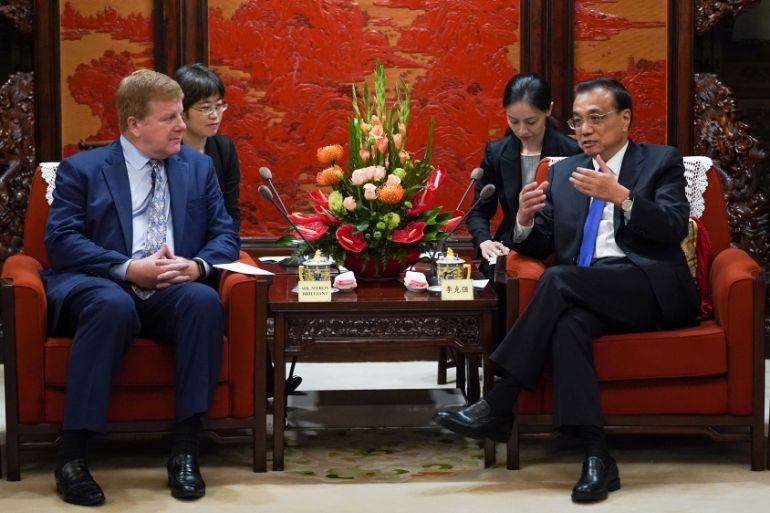Ahead of renewed talks, US and China prepare terms of trade deal
Officials to meet soon, but Trump administration members deny that possible interim agreement could delay tariff round.

The United States on Thursday welcomed a promise from China to buy agricultural goods while maintaining the threat of US tariff hikes, as the world’s two largest economies sought to lay the groundwork for upcoming in-person talks.
Lower-level US and Chinese officials are expected to meet within days in Washington ahead of talks between top trade negotiators in early October. Those discussions are aimed at easing a trade war that has rattled financial markets and fueled fears of a looming global recession.
Keep reading
list of 4 itemsPolitics and convenience drive Mexico to be US’s top trading partner
Will Xi and Biden mend US-China relations at the APEC summit?
UK warns of Russia laying ‘sea mines’ to deter Black Sea cargo ships
Global stocks rose on Thursday after both sides made concessions ahead of the talks, with US President Donald Trump delaying an increase in tariffs on Chinese goods by two weeks after China exempted some US drugs and other goods from tariffs on Wednesday.
But Trump’s trade advisers are not considering an interim trade deal with China that would further push out or roll back some US tariffs, the CNBC network reported on Thursday, rebutting a Bloomberg report that a limited deal was under consideration.
A senior White House official said an interim deal was “absolutely not” on the table, not even in return for Chinese commitments on intellectual property and agricultural purchases.
And US Treasury Secretary Steven Mnuchin sought to temper any optimism, saying that Trump was prepared to keep or even raise tariffs on Chinese imports and that Beijing had asked for more concessions beyond the removal of tariffs.
Meanwhile, The Wall Street Journal reported that China was seeking to narrow the scope of negotiations to trade matters – by excluding national security issues – in order to jump-start the talks.
China bean purchases
Chinese importers bought at least 10 boatloads of US soya beans on Thursday, their most significant purchases since at least June, traders said, ahead of high-level talks next month.
The purchases, totaling at least 600,000 tonnes, are slated for shipment from US Pacific Northwest export terminals from October to December, two traders with knowledge of the deals told the Reuters news agency.
The soya development was another indication that trade tensions between Washington and Beijing may be easing, after hitting a low last month when China suspended all US farm product purchases in response to threats by Trump to impose more tariffs on Chinese goods.
US soybean exports to China, the world’s top buyer, have plummeted during the bitter dispute, with swelling supplies sending prices to near-decade lows and US farmers struggling to turn a profit. Benchmark Chicago Board of Trade soya bean futures jumped to one-month highs on Thursday.
‘Gesture of goodwill’
Speaking at a weekly news briefing in Beijing on Thursday, Chinese Commerce Ministry spokesman Gao Feng said China welcomed the US delay to its scheduled tariff hike on billions of dollars worth of Chinese goods.
“According to my understanding, Chinese firms have started to inquire about prices for US agricultural goods,” Gao noted. “[China] hopes both sides would continue to meet each other halfway and adopt concrete actions to create favourable conditions for negotiations.”
Purchases of US farm goods would include soya beans, as well as pork, Gao said. Both products are still subject to hefty Chinese duties.
Despite tariffs of 62 percent in place since last year, US exports of pork to China jumped 51 percent in the first seven months of 2019 over last year to 240,000 tonnes, according to the US Meat Export Federation.
In July alone, the US exported about 3,000 containers, or almost 61,000 tonnes of pork, as buyers stepped up purchases amid a huge shortfall in China – due to a massive outbreak of African swine fever that has driven prices to record levels.
China reduced purchases of US farm products in August after Trump vowed to impose new tariffs on around $300bn of Chinese goods, dimming prospects of a deal.
On Wednesday, the US agreed to delay increasing tariffs on $250bn worth of Chinese imports from October 1 to October 15 “as a gesture of goodwill”. The tariffs on those goods were set to increase to 30 percent from 25 percent.
Earlier on Wednesday, China announced it was exempting 16 types of US products from tariffs, including some lubricants and anti-cancer drugs, as well as the animal feed ingredients whey and fishmeal.